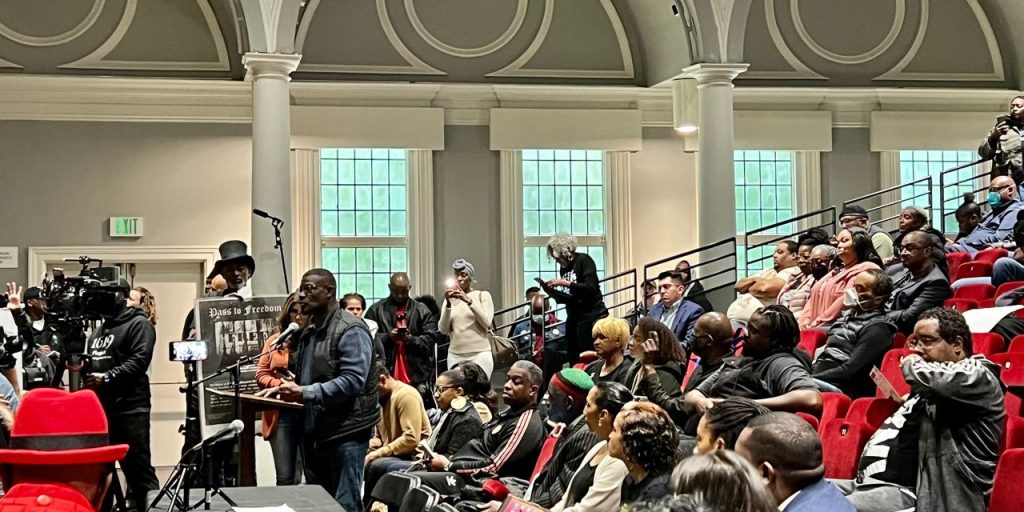After a sometimes contentious day-long meeting Saturday, California’s reparations task force approved a sweeping set of recommendations — including potentially hundreds of billions of dollars in monetary reparations — for repair and restitution for harms experienced by African Americans as a result of slavery and the state’s subsequent policies and practices.
The task force was born out of a 2020 law that established the first state-level reparations effort of its kind in the nation. The final report by the panel, which has been meeting for two years and last year released an interim report, is due to the state legislature this summer. The task force determined Saturday that it will present the report and hold its final meeting June 29 in Sacramento.
Among the most consequential recommendations the task force voted to finalize during its second-to-last meeting as a body at Mills College in Oakland, Calif., were the calculations of suggested monetary reparations by economic experts.
There is no total cost in the report, because monetary reparations would vary according to an eligible person’s age, length of residence in the state and more. But based on Black, non-Hispanic Californians’ average life expectancy of 71 years old, each eligible person who has lived in the state their entire life could be eligible for more than $1 million.
Economic experts who worked to try to calculate monetary compensation for five main harms determined by the task force could not produce dollar figures for all of them because there is a lack of available data, they said. The total compensation amounts for which they produced dollar figures are as follows:
- For health harms to African-American descendants of enslaved people from 1850 to the present, the proposed compensation is $13,619 for each year spent as a California resident.
- For harms from housing discrimination, the recommended compensation amount is equivalent to the African-American and white homeownership gap in California, which was $145,847 in 2020 dollars. For harms as a result of redlining, the proposed amount is $3,366 for each year between 1933 and 1977 spent as a resident of the state.
- For harms because of mass incarceration and overpolicing, the recommended compensation amount is $2,352 for each year of residency in California from 1971 to 2020.
There were no amounts recommended for unjust property takings and devaluation of African-American businesses, although the experts suggested possible formulas for them.
Other recommendations included a plethora of policy changes, an apology by the state and the creation of a Freedmen Affairs Agency, a new state agency that would, among other things, handle claims for reparations.
Related: Reparations proposal in California will include a new ‘Freedmen’s Bureau’
Also: How to pay for reparations in California? ‘Swollen’ wealth could replace ‘stolen’ wealth through taxes.
At the beginning of the meeting, the task force heard from many members of the public, including those who were critical of the task force and the draft report. At one point, a public commenter who slammed the Ku Klux Klan called task-force vice chair Amos Brown — who also sits on the San Francisco reparations board, is head of the NAACP’s San Francisco branch and has been criticized for the NAACP’s comments that proposed monetary reparations for that city’s residents aren’t feasible — “one of them.”
Chair Kamilah Moore urged members of the public to refrain from making “personal attacks.” Moore also asked for a couple of members of the public to be escorted from the room for what she called disruptive behavior.
Other commenters were emotional and defiant about what they said has been a long road and a long wait for reparations. “I’m so tired of my people’s suffering,” one woman said. Others said Black people should make sure to vote for politicians who support reparations: “No reparations, no vote,” one person said.
As the meeting continued and the task-force members discussed finalizing the report, they had some tense discussions over requested changes and edits. Among the points of contention were a request by Moore to add a chapter specifically about eligibility, which reflected a concern voiced earlier by some commenters. The task force decided last year that only Black descendants of enslaved people would be eligible for reparations.
California Department of Justice staff, who have been working with the task force as mandated, said it was too late in the process to add a chapter. The panel voted to add some language to the executive summary to make eligibility even clearer.
The members of the nine-member task force, which will disband once the report is submitted this summer, were appointed by California Gov. Gavin Newsom and the leaders of the state senate and assembly. Prior to Saturday’s meeting, they had met in public 15 times, both virtually and in person.
From the archives (June 2022): Reparations are a ‘human rights issue’ that will boost the economy, says California task-force chair
Read the full article here
